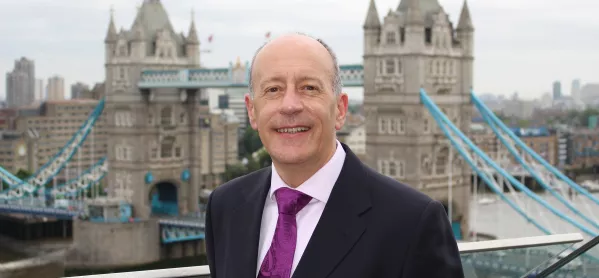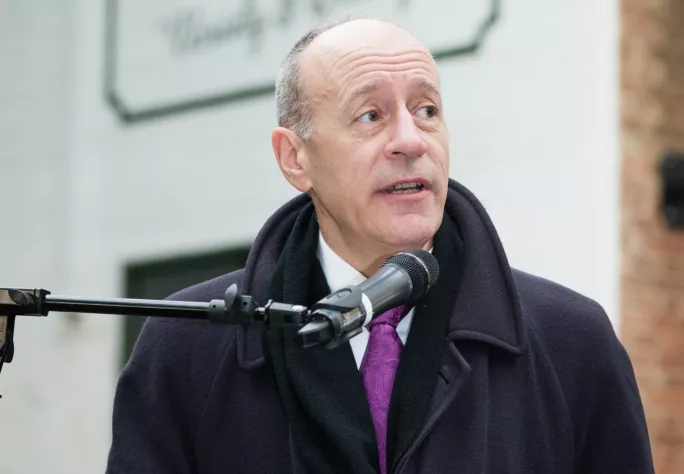- Home
- Jules Pipe: the ‘unexpected’ deputy mayor of London
Jules Pipe: the ‘unexpected’ deputy mayor of London

Jules Pipe has become a familiar face as the deputy mayor of London - a post he’s held since 2016. But finding himself as a key figure in that iconic glass office nestled on the side of the Thames was, as he puts it, “unexpected”.
Pipe is a true Londoner. He grew up at the end of the District line, in Upminster. When it came to choosing where to attend university, he opted to stay in the capital, and gained a degree in chemistry. He had a keen interest in journalism and photography, and freelanced for a while before working as a sub-editor for The Sunday Times and then The Sunday Telegraph.
It was his time spent at newspapers that really heightened his interest in local politics, and in 1996, he “ended up” being elected as a backbench councillor in Hackney Council.
Sadiq Khan interview: ‘Involve employers in post-16 courses’
Background: £630m in adult education funds handed to mayors
Opinion: Why evolution of devolution could boost FE in London
Leader of the group
He started off there as a “sensible member in a minority Labour group”, but “circumstances ended up throwing me kind of towards the front of it, and I ended up finding myself the leader of the group”.
“And then, unexpectedly, because of a series of by-elections, the leader of the council,” he says. Pipe was in that post for just over a year.
In 2002, a referendum in Hackney saw residents voting in favour of having a directly elected mayoral system. “I ended up becoming the candidate. I do feel, looking back, that a lot of it was because I was the last person to step backwards.
“It was only really when asking for people to volunteer [to be a candidate for mayor] that I made a conscious decision to absolutely go for it,” he says.
An unexpected success
There’s almost a sense of surprise about the roles he’s held. Pipe doesn’t brag, or speak proudly about his rise up the political ladder - he uses the term “unexpected” a lot.
Speak to those who work for him, however, and they’ll tell you there’s nothing unexpected about his success: he works hard, and it pays off.
Pipe won four elections in Hackney, and during his time as leader and then mayor, the borough transformed - every single secondary school in the borough was rebuilt, the streets were cleaned up, council tax was frozen for a decade, council services won awards, more homes were built.
Pipe describes being bitten by the political bug - and finding himself overwhelmed with a passion for changing how the authority worked, and ensuring that it served the community of Hackney.
His move across to the mayor’s office after 20 years at the council allowed him to look across the entirety of London - an “interesting task”, he says.
Interesting…and busy. Pipe holds three briefs: planning, regeneration and skills. And it’s the latter that has led to his becoming a person of interest to the further education sector.

The adult education budget
In August this year, the adult education budget - £300 million - was devolved to the Greater London Authority. It’s still early days, and Pipe says it’s hard to tell if anything is working badly.
However, he does say that the feedback that they’ve had from colleges has been largely positive - and attributes it to college staff finally having a “human face” to talk to.
“The [Education and Skills Funding Agency] was so reduced in headcount and therefore what kind of engagement they could have with the colleges. There was a little bit of controversy about the amount of staff we took on to do it, but we said, ‘Look, we’re going to do it, we’re going to do it properly’.
“If we’re just gonna roll over on what has gone before now, we might as well just, like, find out what everyone’s currently paid, employ one person to write the cheques once a week and be done with it,” he says.
They don’t want to rock the boat too much - having some stability is important, he says. The one major change that has been made - ensuring adults who earn less than the London living wage have their training fully funded - was well received by colleges.
If Pipe’s boss, mayor of London Sadiq Khan, gets his way, funding post-16 education and non-levy apprenticeship too would be devolved.
Pipe says that for far too many employers, there’s a gap between employability and apprentice ability. He suggests that “very basic” introduction to work courses would be taken before prospective employers consider learners as apprentices.
Careers advice is another area that Pipe and Khan believe they could improve for the capital if granted control over funding.
“We work closely with the borough and they have a much better handle than we do, let alone the [Department for Education], about the needs in their localities,” he says. He cites hospitality as an example - an industry with workforce shortages.
“There’s no point saying ‘hospitality is hospitality’, because it’s not. London has got high-end hotels with huge employment numbers, and a real kind of career structure and opportunities. And then you’ve got some…I won’t name the brands, but you know, there’s one person on the front desk.
“Some boroughs don’t have those high-end opportunities - some colleges locally don’t provide the right courses,” he says.
Under the Greater London Authority, careers services would be much more “stitched together”.
Further education funding
But how likely is it that this could happen? Politically, it’s a difficult time to embed any changes. No one knows what’s going to happen in the next few weeks, let alone in a few months, or years.
Pipe acknowledges this: “It took a long time for the [adult education budget] to be devolved: a good six years. It’s about the long game. We have to talk about it now. All that vocational funding…It would make sense if all of that came to the mayor. We want to have this pan-London view about the educational needs of young people, but also the needs for employers: it’s all so fragmented at the moment.”
And so, with the possibility of further funds being devolved in the future, FE providers and colleges in London continue to rely on central government funding for much of their provision as everyone else - and welcomed chancellor Sajid Javid’s announcement of an extra £400 million for FE in September.
Pipe says he has a problem with announcements on money. Why? “There are either rehashes of money that was going to be spent anyway or is already being spent. They’re rarely ever given in terms of what actually needs to be achieved.
“If we want to achieve the things that we want to achieve as a country and the industry wants to achieve, then it’s all got to be reassessed.
“It’s just not enough,” he says.
Pipe’s comments echo those heard in colleges across London. And as a man who’s dedicated his life to London, there’s nothing unexpected about that.
Keep reading for just £1 per month
You've reached your limit of free articles this month. Subscribe for £1 per month for three months and get:
- Unlimited access to all Tes magazine content
- Exclusive subscriber-only stories
- Award-winning email newsletters



